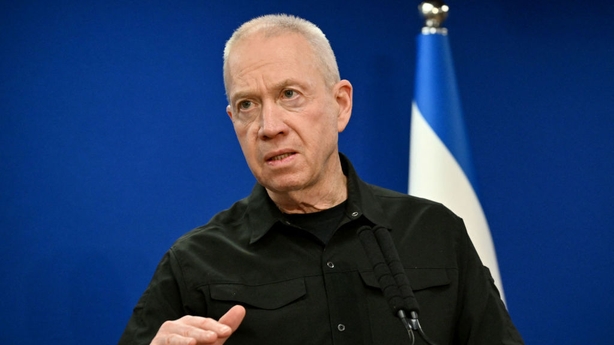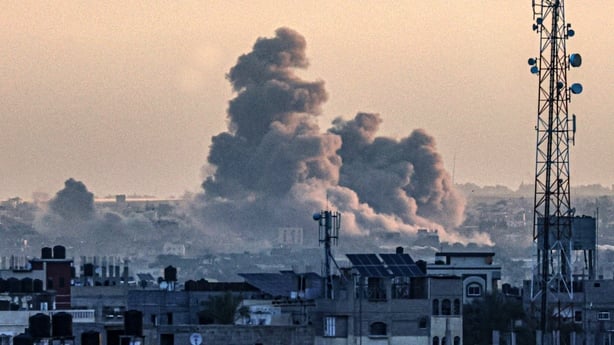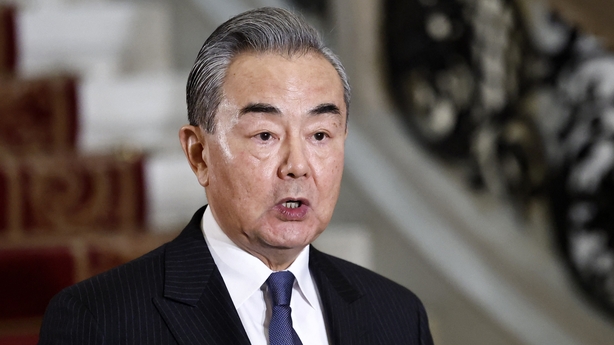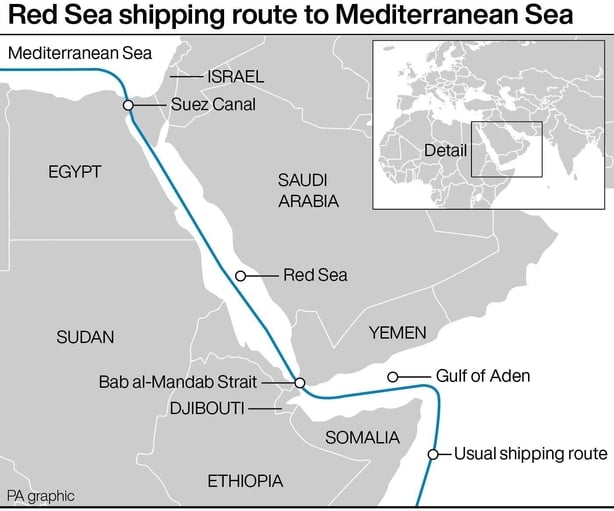Palestinian militant group Hamas has released a new video announcing the death of two Israeli hostages who were taken to Gaza on 7 October.
The video showed a woman hostage named in Israeli media as Noa Argamani, 26, speaking under duress, revealing that two men she was held captive with had been killed in captivity.
It was not clear when the video was taken.
In a statement released with the video, Hamas's armed wing, the Ezzedine al-Qassam Brigades, said the two men were killed in "the Zionist army's bombing".
Hamas released another video showing Ms Argamani along with two men hostages who were seen alive.
The same men were announced dead in the video.
Israeli media have named the two men as Yossi Sharabi, 53, and Itay Svirsky, 38.
Israel's army called Hamas' release of the video a "brutal use of innocent hostages".
Israeli investigation underway
Military spokesman Daniel Hagari rejected Hamas' claim the hostages, including Svirsky, were killed by Israeli forces.
"This is a lie by Hamas," he said.
"The building in which they were kept was not a target and it was not attacked by our forces," Mr Hagari told reporters.
But he added: "We know that we hit targets near the location where they were held" and an investigation is underway.
It is "examining the pictures that Hamas is disseminating, alongside additional information that we have," Mr Hagari said.

Shortly after the video's release, Israel's Defence Minister Yoav Gallant told a news conference that Hamas was applying "psychological pressure" to the families of the hostages.
The army was helping the families, he said, and keeping them up to date with any developments.
"Hamas has been hit hard by the IDF (military)," he said.
"What's left for it is to touch a sensitive nerve in Israeli society through acts of psychological abuse against the family members."
Ruling out any ceasefire in Gaza, Mr Gallant reiterated that the only way to get the hostages back home was by continuing to apply "military pressure".
Otherwise, he said, "nobody will talk to us" and we "will not succeed in reaching any agreements."
Mr Gallant also said that the intensive phase of Israel's war with Hamas militants in southern Gaza will end soon, as the army confirmed a division deployed there had pulled out.
The army had stepped up military operations and bombardments in the southern cities of Khan Yunis and Rafah in recent weeks after saying Hamas's military structures in the north had been dismantled.
"We made it clear that the intensive manoeuvring stage would last for approximately three months," Mr Gallant told a news conference.
He said the stage was already being reached in northern Gaza.
"In southern Gaza we will reach this achievement and it will end soon, and in both places, the moment will come when we will move to the next phase," he said, without specifying a time frame.
Gaza death toll above 24,000 - health ministry
Earlier, health officials in Hamas-run Gaza reported that the death toll in the war with Israel has risen to more than 24,000.
The health ministry in Gaza, ruled by Hamas since 2007, reported more than 60 "martyrs" overnight, in what the group's media office described as "intense" Israeli bombardment.
The Hamas government media office said two hospitals, a girls' school and "dozens" of homes were hit.
Hamas-affiliated Palestinian Press Agency SAFA reported fierce clashes between Hamas militants and Israeli forces in Khan Younis, while Israeli tank barrages were also reported near the Al-Bureij and Al-Maghazi refugee camps in central Gaza.
Palestinian health officials in Nasser Hospital in Khan Younis said later that seven people were killed and others hurt in an Israeli missile strike nearby the medical facility.
The Israeli army said on its website an entire division of soldiers had completed their withdrawal from Gaza, after having "eliminated hundreds of terrorists" and destroyed kilometres of tunnels in central and northern areas of the Palestinian territory.
Israel had four divisions operating in Gaza before the announced withdrawal, though it was unclear how many soldiers were involved in the pullout.

In Al-Nuseirat refugee camp, local journalist Doaa El-Baz showed footage of what had once been the street where she lived.
"This whole neighbourhood is destroyed. Not a single house has been spared," she said, standing before mounds of rubble. "They killed all our dreams here."
In a statement, the Israeli military said it had killed two Palestinian fighters in an airstrike on their vehicle as it was transporting weapons in Khan Younis, and also raided a Hamas command centre in that city and struck two arms caches.
Separately, two Palestinians carried out coordinated car-rammings in the central Israeli town of Raanana, killing a woman and injuring 12 other people, police and medical officials said.
The two suspects were from the same family in Hebron in the Israeli-occupied West Bank and at least one of the vehicles used in the attacks had been stolen, police said.
Hamas later linked the incidents to Israeli "crimes".
"The operation represents a response to crimes conducted by the occupation (Israel). It is further evidence that the conflict with the occupation is expanding," Sami Abu Zuhri, head of Hamas' political unit in exile, told Reuters.
Read more: Timeline: 100 days of war between Israel and Hamas
Three killed in West Bank clashes
Earlier, three Palestinians were killed in the occupied West Bank in two separate clashes with the Israeli army, the Palestinian health ministry said.
Two Palestinians in their 20s were killed in an Israeli army operation in Dura, in the southern West Bank, witnesses told an AFP journalist.
They described seeing young Palestinians throwing stones and hearing gunshots.
"All of a sudden, soldiers arrived in our town and started shooting at people without any warning," Mohammed Rabaei, head of Dura hospital, told AFP.
Nine people were wounded in the violence, including four left in a critical condition, according to the health ministry.
The Israeli army did not immediately respond to a request for comment.
'Two-state solution'
Speaking in Egypt at the weekend, Chinese Foreign Minister Wang Yi called for the prompt resumption of Israel-Palestinian peace talks involving "the formulation of a specific timetable and road map for the implementation of a 'two-state solution'".

However, there have been no peace talks since the last round collapsed amid mutually irreconcilable demands in 2014, with the Western-backed Palestinian Authority that had negotiated with Israel deeply unpopular among Palestinians and its rival Hamas - which had ruled Gaza since 2007 - sworn to Israel's destruction.
Israeli Prime Minister Netanyahu has repeatedly brushed aside calls for a ceasefire in Gaza, saying Israel will keep going until it achieves complete victory over Hamas and recovers the remaining hostages.
Mr Wang, who is on a regional tour, said last week that Chinese President Xi Jinping had "in-depth communication" with the leaders of Saudi Arabia and Iran.
China's top diplomat has also held talks with the Secretary-General of the Arab League and expressed concerns over the Red Sea, Xinhua reported.
Read more about the Israel-Hamas conflict

New UN ceasefire call
United Nations agencies renewed their appeal on Monday for a humanitarian ceasefire in Gaza.
UN Secretary-General Antonio Guterres has called for an "immediate humanitarian ceasefire".
"We need an immediate humanitarian ceasefire. To ensure sufficient aid gets to where it is needed. To facilitate the release of the hostages. To tamp down the flames of wider war because the longer the conflict in Gaza continues, the greater the risk of escalation and miscalculation," Mr Guterres said at a press briefing in New York.
"We need unimpeded, safe access to deliver aid and a humanitarian ceasefire to prevent further death and suffering," said Tedros Adhanom Ghebreyesus, head of the World Health Organization (WHO), adding that hunger would further harm the sick and make "an already terrible situation catastrophic".
A video clip circulating on social media showed crowds of people running beside U.N. vehicles on a beach in Gaza City hoping to get some aid. People were then shown carrying away bags of flour. Reuters was able to verify the location shown in the clip but not the date it was filmed.
Fears are growing of a wider conflict in the Middle East.
Pledging solidarity with the people of Gaza, Houthi fighters who control much of Yemen have stepped up attacks on ships in the Red Sea it says are linked to Israel or bound for Israeli ports. These attacks triggered US and British airstrikes on Houthi targets last week that have in turn prompted threats of a "strong" response from the Iran-backed militia.
The group's chief negotiator, Mohammed Abdulsalam, told Reuters on Monday that Houthi attacks on shipping would continue until Israel halts its offensive in Gaza and humanitarian aid is allowed to flow freely into the Strip.
The United Kingdom Maritime Trade Operations (UKMTO)agency said on Monday it had received a report that the port side of a vessel was hit from above by a missile southeast of Yemen's port of Aden. It advised ships to transit the area with caution.
Governing after the war
Earlier, Mr Gallant said that Palestinians will govern Gaza when the war ends.
"Palestinians live in Gaza and therefore Palestinians will govern it in the future.
The future Gaza government must grow out of the Gaza Strip," Mr Gallant said at a press conference.
"At the end of the war there won't be a military threat from Gaza. Hamas won't be able to rule and function as a military force in the Gaza Strip."
He said the future government would be a "civilian alternative" but insisted that Israeli forces would have the "freedom of operation" in a way aimed at protecting Israeli citizens.
